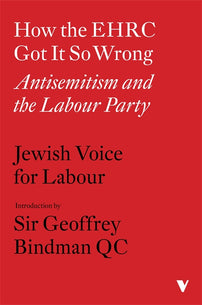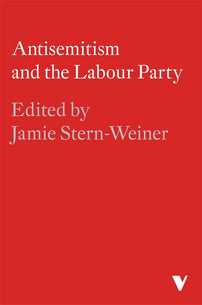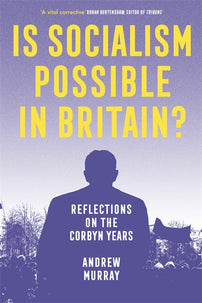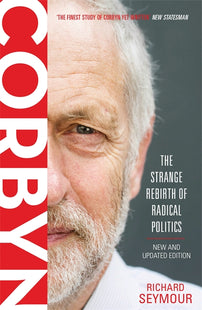The EHRC Fails Again
As the Report into Antisemitism in the Labour Party hits the news again, essential facts remain missing that continue to distort and prejudice the debate. Richard Kuper, web editor for JVL, sets the record straight.

The Equality and Human Rights Commission (EHRC)’s Report Antisemitism and the Labour Part, published in October 2020, has acquired an utterly unfounded reputation and is regularly misrepresented in the media as having proved that Jeremy Corbyn was an antisemite and that the Labour Party was institutionally antisemitic.
These assertions are untrue but they have become the taken-for-granted conventional wisdom, surfacing again and again. Most recently it re-emerged after an EHRC statement on 15 February giving Keir Starmer’s Labour Party a clean bill of health regarding the “Action Plan for Driving out Antisemitism”. Variations of the assertions that the Labour Party was guilty of or infested by antisemitism, tout court, appeared in follow-up articles from commentators such as Polly Toynbee and Sonia Sodha, as well as interviews given by Ruth Smeeth (now Baroness Anderson) and Margaret Hodge.
On 19 February Geoffrey Bindman and Jenny Manson appeared on the Not the Andrew Marr Show (NTAMS) podcast regularly hosted by Crispin Flintoff to discuss these latest developments. You can see video clips of their presentations via this link.
In his contribution Sir Geoffrey Bindman KC, who has a distinguished record in the field of human rights in Britain, including being legal adviser to the Race Relations Board and the Commission for Racial Equality for seventeen years, talked about the background to the current role of the EHRC. He explained its origins in the Race Relations Acts 1965 through to 1976 and the development of anti-discrimination legislation to include such issues as sex, age, disability amongst others. Since 2006 the oversight of this legislation was handed over to the EHRC.
In reality, the EHRC has investigated little. This was perhaps the result of a lack of funding and of political will. Furthermore, the body is distrusted by most people from the racialised communities it is supposed to protect. However, it was judged appropriate to take on an investigation of antisemitism in the Labour Party as a result of intensive lobbying. This investigation was conducted during the febrile political atmosphere at the height of the campaign against Jeremy Corbyn.
The Report produced was an odd one. It could, and should, have been challenged on its own terms. Had Corbyn still been leader of the Party it would have been. Even so, it did not say Corbyn was an antisemite. It didn’t say Labour was institutionally antisemitic. Nor was the party riddled with antisemites.
But it did do a political job. The report found the Labour Party guilty on the basis of the discovery that two people (out of 220 cases that might be relevant) had engaged in “unlawful acts”. It found the Party, not the two individuals, responsible by claiming that these two were acting as agents for the Party; a highly questionable assumption. It further found two cases of indirect discrimination. One related to the training of staff investigating complaints of discrimination, which they held was biased against Jewish members – a highly contentious conclusion to draw from the facts. The other related to so-called political interference. As Bindman has noted, the Forde Report questioned this finding.
Thin gruel indeed as we explained (forensically!) in the ebook How the EHRC Got It So Wrong: Antisemitism and the Labour Party, which remains the only substantial analysis of the EHRC Report.
The Report’s findings were, however, enough for the EHRC to be able both to impose a programme of reform on the Labour Party and for it to approve and monitor the ongoing process. In effect, to mark their own homework. This was a programme eagerly accepted by Keir Starmer to aid him in his war against the previous leadership.
[book-strip index="1"]
Bindman has subsequently raised another crucial question: why did Labour not challenge the obviously implausible findings that it had broken the law?
He wrote:
There are two possible reasons, one defensible, though barely, the other not.
The first is that the only sanction imposed by the EHRC following its finding was the requirement to make changes to its investigation process. The party was happy to make these changes and would have agreed to them if merely invited by the EHRC to do so without any investigation or finding of illegality. So what was to be gained by challenging the findings except a paper victory? That is the defensible reason.
The other is that the findings of illegality were welcome to the current leadership because the blame could be heaped on Corbyn and the left and the right would gain in its factional war.
Of course the 'defensible' reason leaves undisputed the hugely damaging and humiliating (and false) implication that Labour and its former leadership was racist, antisemitic, hypocritical, and unfit for government.
Concerns about the Labour party’s lack of integrity and professionalism were magnified by the Forde Report. This was itself an inquiry into the Leaked Labour Report, a document produced for submission to the EHRC but neither finalised nor submitted after the change in leadership. JVL commented on it at the time in a statement The Forde Report: a way forward despite its hesitancies.
The JVL statement made clear that while in presentation “the final [Forde] Report goes to extraordinary lengths to be balanced, “even-handed”, pitting the party machine (HQ) on the one hand against the Corbyn team (LOTO) on the other… much of the substance of the Report confirms what we have been saying over the years about the central issues in contention”. Particularly, the way in which Party HQ had undermined the Corbyn leadership, the factionalism and the stark racism that was openly expressed – and about which nothing appears to have been done.
When it comes to education and training, the Forde Report provides a powerful critique of Labour’s current provision. This really ought to have been thoroughly overhauled in the light of his comments. Of course it hasn’t, and the Forde Report has been effectively buried. The EHRC has shown no interest in it (nor in the substance of the Leaked Report), though Forde’s comments on education and training should be central to any serious programme with regard to antisemitism or any other form of racism.
Jenny Manson in her contribution to NTAMS focused on the accusations levelled against JVL and tried to account for them. There is no doubt that both Hodge and Smeeth suffered huge abuse. But to turn this into unevidenced allegations of antisemitism against Marc Wadsworth and Jeremy Corbyn, as they did, had and has no justification They have since doubled down many times on this accusation. But the fact is that it is terrible for Jews and non-Jews everywhere to live in a climate in which unevidenced claims are thrown around and given validity by the mainstream media.
Why should we in JVL be hated so much? Manson explained:
“What I think this is about is that because we are Jews, we carry some weight, people are finding a little bit harder to dismiss us – and we are daring calling it out. And one of the things that we have called out from the very beginning is the idea that there was a particular problem with antisemitism in the Labour Party under Corbyn. There wasn’t.”
Ruth Smeeth was most directly critical of JVL, saying that it is a minute, tiny organisation, a fringe group not worthy of comment. That much of their leadership has been expelled from the Labour Party because of their beliefs about other Jews. That it have said appalling and abhorrent things. That it had made her life a misery when she was an MP. And finally, that it indulges conspiracy theories and racism.
The interviewer challenged her on none of these assertions. How tiny we are is a matter of opinion but with over a thousand members, over a third of whom are Jewish members of the Labour Party, and with over 24k Twitter followers we are not negligible. The other statements are wholly untrue: no one in JVL has been expelled because of “their beliefs about other Jews”. We simply have not said “appalling and abhorrent things”. Indeed, we have consistently gone out of our way to avoid personal attack or invective, often in the face of personalised criticism. How we “made her life a misery" when she was an MP is a mystery. And we simply do not “indulge conspiracy theories and racism”.
Her statement was prompted no doubt in part by her interviewer (although the BBC has half apologised in response to a sharp letter of complaint). We live in a world in which total misrepresentations of the EHRC Report have become common “truths” and in which accusations against us elicit no scintilla of doubt.
You might recall that one constant justification by those calling for the EHRC investigation was that Jews do not feel safe in the Labour Party. Who are the Jews now not feeling safe in the Party? As Jenny Manson said:
“I don’t go to CLP meetings anymore, I haven’t gone for a long time. A lot of people I know don’t go. I haven’t gone, I don’t feel safe. I happened to be at Labour Party Conference when Louise Ellman was cheered back into the Party and people along the row were all standing up and cheering and they started to look at me because I wasn’t. I felt unsafe and I walked out.”
And Ruth Smeeth, when asked if some Jewish Voice for Labour members “have become too frightened to attend Party meetings for fear of intimidation and abuse” agreed with her interviewer when she suggested that Smeeth’s response would be simply “Tough!”
JVL did respond immediately to Labour being given a clean bill of health by the EHRC in a statement The EHRC has spoken – Labour is no place for left wing Jews , the gist of which was as follows: .
We have stressed again and again to the EHRC over the last two years that if the aim of the operation had been to make Jews feel safe in the Labour Party it was a singular failure – we certainly do not feel safe!
We have repeatedly alerted the EHRC to the disproportionate targeting of Jewish members of the Labour Party for disciplinary action over allegations of antisemitism.
Now we find, ironically, as we point out in our statement, that this targeting of Jews seems to be used to reinforce the claim for the success of the action plan in the name of combating antisemitism!
Only the week before the EHRC “exonerated” Labour, we had alerted it to the latest statistics we have on Jews targeted under Labour’s disciplinary procedures.
JVL is currently aware of fully 60 Jewish Labour Party members targeted, accused on two main counts:
- for challenging the way the Party interprets and purports to eradicate ‘antisemitism’; and
- for criticising the political ideology of Zionism or the state of Israel.
Individuals hounded include Naomi Wimborne Idrissi, a JVL Executive Officer, who was thereby thus prevented from taking up her elected post as the only Jewish member on Labour’s National Executive Committee; Stephen Marks, formerly a prominent voice on Labour’s National Constitution Committee; and Heather Mendick who had worked in Labour’s leadership office in 2019. All were expelled during Chanukah in December 2022.
And we also provided the EHRC with some astonishing estimates, viz.
- A full, Jewish member of JVL is at least 37 times more likely to be investigated for antisemitism than an average Labour Party member.
- A full, Jewish member of JVL is 54 times more likely to be expelled than an average Labour Party member.
- A full, Jewish member of JVL is 63 times more likely to be auto-excluded (i.e., expelled for supporting a proscribed group) than an average Labour Party member.
- A JVL Executive Committee member is 462 times more likely to be auto-excluded (i.e., expelled for supporting a proscribed group) than an average Labour Party member.
We find it “abhorrent for the Labour Party to effectively designate progressive or socialist Jewish political traditions as antisemitic, with the EHRC’s apparent stamp of approval”. It has reached the point at which Jewish members investigated or sanctioned over antisemitism find the experience not simply oppressive: it feels much like antisemitism itself; we feel hated.
And such intimidation and abuse goes unchallenged by the party machine. Our lawyers have informed the EHRC that “the Party has not provided an adequate channel for members to express their dissatisfaction even in cases of serious distress”.





